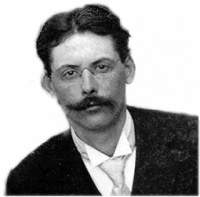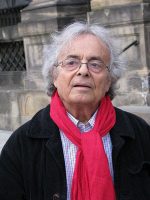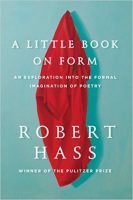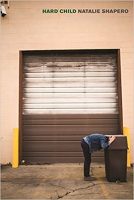April 7, 2017
Edited by David Sanders
Specimen Days
1671—Jean-Baptiste Rousseau, French playwright/poet (Sacred Odes & Songs), is born.
1818—Aasmund Olavsson Vinje, Norwegian poet (d. 1870), is born.
1888—Daniel Andersson, Swedish poet/writer (Svarta Ballader), is born.
1889—Gabriela Mistral [Lucila Godoy y Alcayaga], poet (Noebel Prize 1945) and diplomat, born in Vicuña, Chile (d. 1957), is born.
1935—Edward Arlington Robinson, US poet, dies.
1953—Idris Davies, Welsh poet (b. 1905), dies.

And then there were the leaves that plagued him so!
The brown, thin leaves that on the stones outside
Skipped with a freezing whisper. Now and then
They stopped, and stayed there—just to let him know
How dead they were; but if the old man cried,
They fluttered off like withered souls of men.
—from “The Pity Of The Leaves” by Edwin Arlington Robinson
“the leaves that plagued him so! / The brown, thin leaves that on the stones outside / Skipped with a freezing whisper.” – Edwin Arlington Robinson
World Poetry
Facebook Restores Controversial Poem of Noted Bengali Poet Srijato Bandyopadhyay

A day after 'accidentally' removing the controversial poem of noted Bengali poet Srijato Bandyopadhyay, Facebook authorities has restored it. "The post was accidentally removed and has now been restored. This was a mistake, and we are sorry," a Facebook spokesperson said today.
Political Poetry as a Crime: Inside the Surreal Trial of Dareen Tatour

It has been nearly a year and a half since Palestinian poet Dareen Tatour was arrested in her home for writing a poem. She spent three months in various prisons, including half a year under house arrest in the town of Kiryat Ono near Tel Aviv. Although she was able to return to her home village of Reineh, near Nazareth, she remains under house arrest as the trial comes to an end.
Syrian Poet Adonis Wins $50,000 Lifetime Achievement Prize

Syrian poet and translator Adonis has won a $50,000 prize from PEN America for lifetime achievement. The literary and human rights organization also has handed out prizes for best book of 2016 and best debut fiction.
A day after ‘accidentally’ removing the controversial poem of noted Bengali poet Srijato Bandyopadhyay, Facebook authorities has restored it.
Recent Reviews
Bill Knott’s Anti-career of Guerilla Poetry
by Dan Chiasson
Near the counter of the old, lamented Avenue Victor Hugo Bookshop in Boston, there were boxes of ephemera: the standard hodgepodge of mangy postcards, wedding announcements, lobby cards, 45s, hippie stickers and patches, Civil Defense pamphlets and evacuation maps, poker chips, Old Maid decks, and the like, along with skinny small-press or homemade books, some even handwritten. It was in one of those boxes, in the early nineties, that I found a copy of “Are You Ready, Mary Baker Eddy???,” published, in 1970, by Cloud Marauder Press, out of Berkeley. Its four authors—Bill James, Knott Tate, James Bill, and Tate Knott—were, in point of fact, two people. One was James Tate, the American surrealist poet. The other was Bill Knott, an obscure but equally intriguing figure: a poet, artist, and illustrator, who penned several books, leaflets, chapbooks, and broadsides, along with, years later, blog posts and comment-section diatribes. Tate went on to literary fame and success. Knott forged, instead, an anti-career of guerrilla mischief, waged on the margins.
Second Acts: A Second Look at Second Books of Poetry: Rosanna Warren and Melissa Range
by Lisa Russ Spaar
On November 10, 2012, the Los Angeles Review of Books published my inaugural installment in this Second Acts Series, which pairs a second book of poems that first appeared in print 20 or more years ago with a recently published second collection. To say that much has changed — in poetry, politics, the environment, technology, et cetera — in the half-decade since is an understatement. These essays — on average I’ve published one every two months or so — have allowed me to keep my finger on the pulse of the new while honoring important work from the past. Before taking a closer look at second books by Rosanna Warren and Melissa Range, I’d like to revisit some of the things I said in that first column about first and second books, and about our infatuation with the new.
Emily Berry, Stranger, Baby
by Annie Muir
Emily Berry’s second collection, Stranger, Baby – published this year by Faber & Faber, is luminous green and hard to put down. Berry’s first book Dear Boy (2013) is, as its title suggests, openly concerned with the nature of address. From the first line of the first poem – ‘We always breakfast with the biographer’ – the book is full of notes for other people, addressed to specific friends, doctors and lovers. They are jokes and anecdotes that we, the audience, are involved in, overhearing them rather than being spoken to directly.
Emily Berry’s second collection, Stranger, Baby – published this year by Faber & Faber, is luminous green and hard to put down.
Broadsides
Drinking Too Many Coffees with the Great Russian Poet Joseph Brodsky
by Mikhail Baryshnikov
I first met the poet Joseph Brodsky at a dinner in New York in early autumn 1974. I had just escaped from the Soviet Union, and he had been thrown out of the country two years before. After the dinner we went to a café in Greenwich Village. I remember drinking so many espressos – something I wasn’t used to – that I couldn’t fall asleep afterwards because of the heartbeat.
Anthony Hecht & the Trauma of War
by David Yezzi
On memory and pain in the works of the American poet.
Mnemosyne—Titaness and personification of memory in Greek mythology—was mother to the Muses; her nine consecutive nights of coition with Zeus produced lyric poetry, history, music, tragedy, astronomy, and so on. Memory, like the Muses themselves, will not always perform on command; trying to recall a past event doesn’t necessarily get one very far. But, as Marcel Proust knew, occasionally the past comes back unbidden and more vividly than if it had been consciously called up.
Why Every Poet Uses "Poet Voice"
by Niall O'Sullivan
If there is a style of reading that is widely held to ridicule it is the Poet Voice – a highly affected method that signifies “I AM READING A POEM”. While practioners of live literature may have their differences, they are united by their disdain for it. At least that is what I thought. Firstly, not everyone means the same thing when they speak of Poet Voice. Those from a literary background often refer to poetry voice in the sense that is explained in this article by Rich Smith and satirised here by the comedian Andy Hamilton. It is a soft, breathy, rendering of the line that gradually descends in pitch with each stress before inflecting upward to mark the end of each line or sentence.
If there is a style of reading that is widely held to ridicule it is the Poet Voice – a highly affected method that signifies “I AM READING A POEM”.
Drafts & Fragments
This Arab Airline's 'Electronics Ban' Poem Competition is Seriously Epic
Royal Jordanian strikes again!
by Leyal Khalife
Royal Jordanian's fight against the "electronics ban" is still going strong – with its most recent campaign being a poem – offering passengers an additional 5 kgs when flying to North America. After receiving an outpouring of support online, the flag carrier asked its followers on social media to put their creativity to work, by creating their own electronics ban poems. The prize? Two tickets to the US.
Royal Jordanian airline is asking its followers on social media to write poems about the “electronics ban.” The prize? Two tickets to the US.
Poetry In the News
Acclaimed Russian Poet Yevgeny Yevtushenko Dies in Oklahoma

Acclaimed Russian poet Yevgeny Yevtushenko, whose work focused on war atrocities and denounced anti-Semitism and tyrannical dictators, has died. He was 84. Ginny Hensley, a spokeswoman for Hillcrest Medical Center in the eastern Oklahoma city of Tulsa, confirmed Yevtushenko’s death. Roger Blais, the provost at the University of Tulsa, where Yevtushenko was a longtime faculty member, said he was told Yevtushenko died Saturday morning.
2017 Walt Whitman Award Goes to Jenny Xie
Poet Jenny Xie has won the Walt Whitman Award for an outstanding debut collection.
The Academy of American Poets told the Associated Press on Wednesday that Xie was chosen for “Eye Level.” As winner of the Whitman prize, Xie will receive $5,000, a six-week residency in Italy and a publishing deal with Graywolf Press, which will release her book in April 2018. The country’s poet laureate, Juan Felipe Herrera, served as judge for the Whitman award. In a statement, he praised “Eye Level” for its “beauty, clarity and expansive humanity.”
Acclaimed Russian poet Yevgeny Yevtushenko, whose work focused on war atrocities and denounced anti-Semitism and tyrannical dictators, has died.
New Books
A Little Book on Form: An Exploration into the Formal Imagination of Poetry by Robert Hass
[Hardcover] Ecco, 464 pp., $29.99

In addition to his magisterial poetry, Robert Hass is beloved for his incisive, meditative criticism. A Little Book on Form takes up the central contradiction between poetry as genre and the poetics of the imagination. A wealth of vocabulary exists with which to talk about, map, and explain poetry in rigorous formal terms. But the more intuitive, creative aspects of a poet’s work and processes are more elusive: if the most interesting parts of form are those expressive, essential gestures inside it, how can we come to a better understanding of form as passion, as art?
Dark Convicts by Judy Johnson
[Paperback] UWAP Poetry, 100 pp., $22.99
It is a little known fact that eleven African American convicts arrived in Australia on the First Fleet in 1788. Two of these ex-slaves were the author's ancestors. In extensively researched poems, award-winning writer Judy Johnson vividly portrays scenes from her black forebearers' lives, both before transportation and afterwards, in the fledgling colony of New South Wales. Dark Convicts uncovers a little known aspect of Australian colonial history, told from the unique vantage point of a descendant.
Still Pilgrim: Poems by Angela Alaimo O'Donnell
[Paperback] Paraclete Press,128 pp., $18.00

Still Pilgrim is a collection of poems that chronicles the journey of life as seen through the eyes of a keenly-observant friend and fellow traveler. The reader accompanies the Still Pilgrim as she maps universal terrain, navigating the experiences that constitute her private history yet also serve to remind the reader of his or her own moments of enlightenment, epiphany, and encounter with mystery. Each of the 58 poems of the collection marks a way station along the pilgrimage where the Pilgrim and reader might pause and ponder before continuing with the inevitable march forward.
Afterland: Poems by Mai Der Vang
[Paperback] Graywolf Press, 96 pp., $18.00
Afterland is a powerful, essential collection of poetry that recounts with devastating detail the Hmong exodus from Laos and the fate of thousands of refugees seeking asylum. Mai Der Vang is telling the story of her own family, and by doing so, she also provides an essential history of the Hmong culture’s ongoing resilience in exile. Many of these poems are written in the voices of those fleeing unbearable violence after U.S. forces recruited Hmong fighters in Laos in the Secret War against communism, only to abandon them after that war went awry. That history is little known or understood, but the three hundred thousand Hmong now living in the United States are living proof of its aftermath. With poems of extraordinary force and grace, Afterland holds an original place in American poetry and lands with a sense of humanity saved, of outrage, of a deep tradition broken by war and ocean but still intact, remembered, and lived.
Hard Child by Natalie Shapero
[Paperback] Copper Canyon Press, 96 pp., $16.00

Thought-provoking and sardonically expressive, Shapero is a self-proclaimed “hard child”—unafraid of directly addressing bleakness as she continually asks what it means to be human and to bring new life into the world. Hard Child is musical and argumentative, deadly serious yet tinged with self-parody, evoking the spirit of Plath while remaining entirely its own.
Still Pilgrim is a collection of poems that chronicles the journey of life as seen through the eyes of a keenly-observant friend and fellow traveler.
Correspondences
Vona Groarke: ‘If you want to change things, stand for election. Poems aren’t part of that’
by Ciaran Carty

“Slogans drive me crazy,” says Vona Groarke. She’s talking about divisive catch-cries like “We want our country back” and “America first” and whether with democracy under threat poetry has a responsibility to become political. “I’m tremendously interested in politics but I come out in a rash at the idea of being a political poet. If you want to change things, stand for election. Go on and do it. Put yourself out there and fight your fight. But don’t think writing a poem is part of that.”
Interview: Poet Laureate Robert Pinsky on his Work and the World
Colette Bancroft

Poetry, Robert Pinsky says, "goes so deep in us. I've discovered with my grandchildren that if you sing to a baby or recite poetry to the baby, you get the exact same result. They curl up into you and relax." Pinsky has put poetry to many other uses. He's the only person to have served three terms as the poet laureate of the United States, from 1997 to 2000. During that time, his signature achievement was the Favorite Poem Project, which reached thousands of communities.
“Slogans drive me crazy,” says Vona Groarke. She’s talking about divisive catch-cries like “We want our country back” and “America first!”
Envoi: Editor’s Notes
Poet Voice
I am susceptible to unscientific studies, I fear. One such "study," of my own devising, suggests that there is a negative correlation between "poet voice" (see the article above) and form. For example, take a look at the poems by the poets offered as examples marked as using "poet voice," Louis Gluck and Billy Collins among them. Many, it seems, are practitioners of a freer verse. If you look, on the other hand at poems by poets who write primarily in form, there is as well a slightly elevated sense of speech, but more often than not, it is also characterized by a surprising casual, if laconic, tone—not much above the level of normal diction. As examples, I offer two: Elizabeth Bishop reading "The Fish" and Philip Larkin reading "Whitsun Weddings." This is not to say that one way is better or worse, but only that one uses the "voice" to heighten the sense of the words, as if the plainly written were more than it is or needed more to lift it off the page, while the other tries to mute the effect of the verse by masking it as more conversational than it appears on the page, and as a result making them sound less "poetic." However, this is a totally unscientific observation that sometimes has occurred to me when I have heard poets read over the years. Feel free to conduct your own tests.